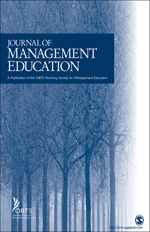Does Anonymity Increase Class Participation?

Clickers allow students to answer
questions anonymously in class.
Universidad de Navarra (cc)
Editor’s note: We are pleased to welcome Alyson Latham and N. Sharon Hill, both of The George Washington University, whose paper “Preference for Anonymous Classroom Participation: Linking Student Characteristics and Reactions to Electronic Response Systems” is forthcoming in the Journal of Management Education and now available in the journal’s OnlineFirst section.
 The purpose of this study was to identify the types of students who respond most positively to the use of an electronic response system (ERS), more commonly known as clickers, to facilitate student participation in the classroom. Student participation in the classroom has been shown to enhance student learning. Clickers are handheld devices that allow students to electronically answer questions presented by the instructor. Their responses are then aggregated via technology and the aggregated results are provided back to the instructor and students within seconds. In this way, clickers allow all students to participate anonymously in class. We were interested in conducting this study because we frequently use clickers in our classes and wanted to know if all students liked using them and found them useful in promoting student engagement and learning. In the study we looked at learner chara
The purpose of this study was to identify the types of students who respond most positively to the use of an electronic response system (ERS), more commonly known as clickers, to facilitate student participation in the classroom. Student participation in the classroom has been shown to enhance student learning. Clickers are handheld devices that allow students to electronically answer questions presented by the instructor. Their responses are then aggregated via technology and the aggregated results are provided back to the instructor and students within seconds. In this way, clickers allow all students to participate anonymously in class. We were interested in conducting this study because we frequently use clickers in our classes and wanted to know if all students liked using them and found them useful in promoting student engagement and learning. In the study we looked at learner chara cteristics that influence students’ preference for anonymous classroom participation, and hence, their reaction to using clickers. The results showed that students will tend to prefer anonymity in responding when they are shy and dislike being the center of attention, when they are afraid of giving an incorrect response in front of others, and when their cultural orientation makes them less willing to share their ideas and thoughts with an instructor who they deem as higher in status. The finding that students’ cultural orientation relates to preference for anonymity and positive student reactions to using clickers is an important one because today’s classrooms are increasingly composed of students from different cultures.
cteristics that influence students’ preference for anonymous classroom participation, and hence, their reaction to using clickers. The results showed that students will tend to prefer anonymity in responding when they are shy and dislike being the center of attention, when they are afraid of giving an incorrect response in front of others, and when their cultural orientation makes them less willing to share their ideas and thoughts with an instructor who they deem as higher in status. The finding that students’ cultural orientation relates to preference for anonymity and positive student reactions to using clickers is an important one because today’s classrooms are increasingly composed of students from different cultures.
We were surprised to find that, contrary to our prediction, performance-prove orientation was not significantly negatively related to preference for anonymity in classroom participation. We had expected that students who tend to seek out opportunities to demonstrate their ability to others would react negatively to the anonymity provided by clickers because it would deprive them of the opportunity to demonstrate their ability to the instructor and other students in the classroom. Study participants’ open-ended comments provided some additional insights in this area. Students who did not prefer anonymity in responding to questions in class were mostly concerned with the rewards (e.g., personalized feedback from the instructor) associated with not being anonymous as opposed to demonstrating ability to others.
Understanding the types of students who prefer to respond anonymously, and who therefore are more likely to react positively to technologies such as clickers that afford anonymity, enables instructors to more effectively implement these types of instructional methods in their classes in a way that meets the needs of diverse class members. A fruitful area for future research related to the findings of this study is to examine the different options for implementing clickers available to instructors as well as the different types of classes in which clickers might be most beneficial.
Read “Preference for Anonymous Classroom Participation: Linking Student Characteristics and Reactions to Electronic Response Systems” online in the Journal of Management Education.































































































Good article. The underlying report as well.